
 |
|
|
#1 |
|
Member
Join Date: Dec 2004
Location: What is still UK
Posts: 5,949
|
While out searching for an over looked treasure for just a few quid today, all I could really afford. I came across this, many, many times a few quid
 . It was either buy it or walk away. Well you can see what happened, I hope the poxy car behaves its self for a few months. . It was either buy it or walk away. Well you can see what happened, I hope the poxy car behaves its self for a few months.Length of flint head approx 18cm. Total length 48cm. Bark binding. Some worm hole damage to the halft. There is a twisted lanyard/loop of old telegraph? wire. The wire is a single steel wire covered in a machine woven flax/hemp like material. There are probably some wire freaks out there but are they watching? get a life! The seller said it is Australian Aboriginal and came from a private collection in Lewes, don't they all  . It could be from the Northern Territories to PNG. I will add pics of similar things from the Torres Straits. Does anybody have pics of anything similar or other examples. yab a dabber do!!! . It could be from the Northern Territories to PNG. I will add pics of similar things from the Torres Straits. Does anybody have pics of anything similar or other examples. yab a dabber do!!!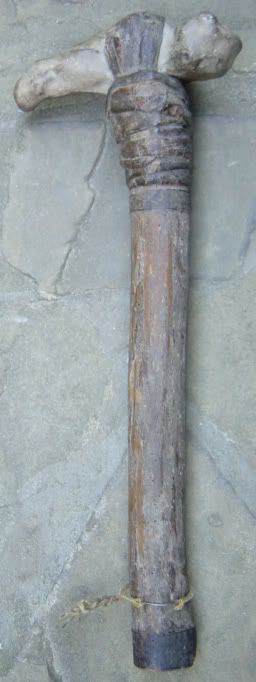 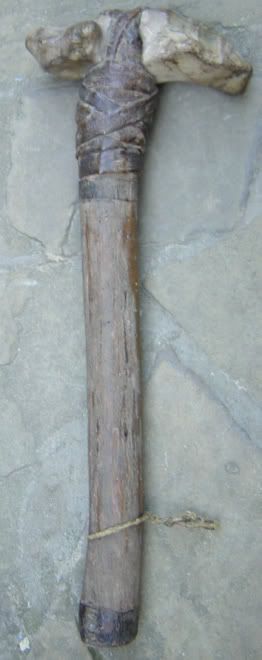 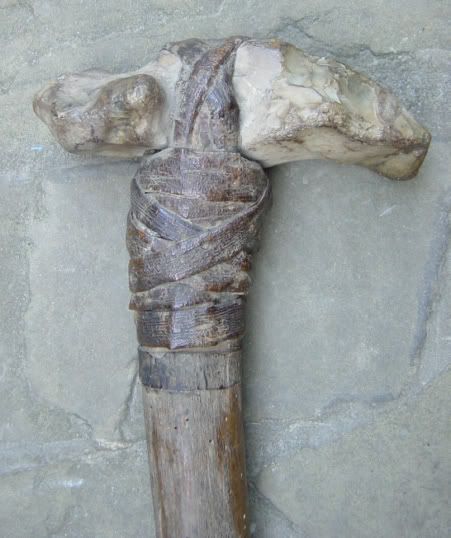 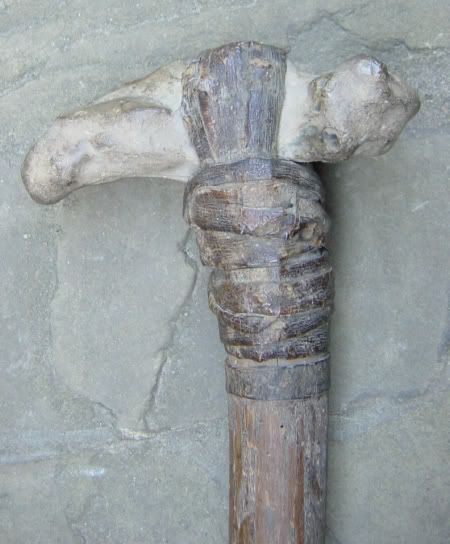 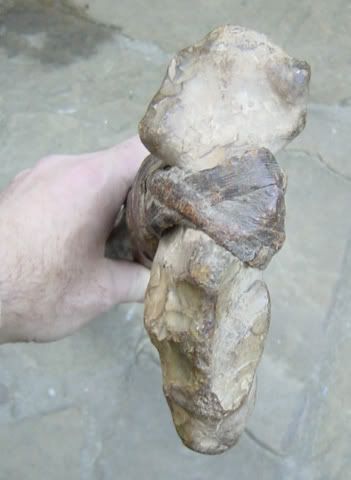 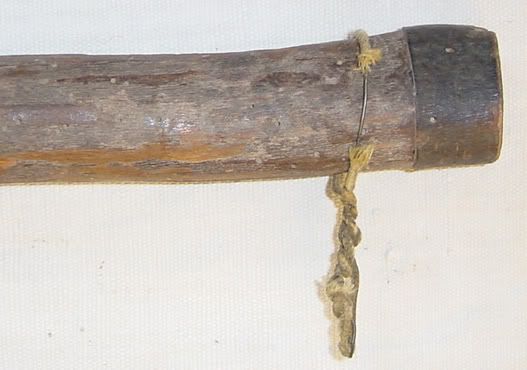
Last edited by Tim Simmons; 17th March 2007 at 11:58 PM. |
|
|

|
|
|
#2 |
|
Member
Join Date: Jan 2006
Location: Kent
Posts: 2,658
|
Certainly has rustic charm Tim, nicely organic
 Are these bi-functional ie weapon and a tool ? The centre 'groove' in the stone head.....is it natural or man-made? Are these bi-functional ie weapon and a tool ? The centre 'groove' in the stone head.....is it natural or man-made?
|
|
|

|
|
|
#3 |
|
Member
Join Date: Dec 2004
Location: The Netherlands
Posts: 1,209
|
I must say Tim, that it looks very very nice to me. I think it is a nice find.
|
|
|

|
|
|
#4 |
|
Member
Join Date: Jan 2007
Posts: 181
|
An aborigine stone club, eh? Does that make the correct war cry "Yabba-Dabba-Didgeri-Doo?"
 Nice piece, not that familiar with Australian aborigine weapons (beyond the ubiquitous boomerang), but I seem to recall their tech level was still solidly in the Neolithic period, right? |
|
|

|
|
|
#5 | |
|
Member
Join Date: Dec 2004
Location: Italia
Posts: 1,243
|
Quote:
More Upper Paleolithic! I think that the central groove is hand made. Verrrry nice!!!! |
|
|
|

|
|
|
#6 |
|
Member
Join Date: Dec 2004
Location: What is still UK
Posts: 5,949
|
Thanks everyone. I have been thinking about this a little more and come up with some ideas.
I am not saying this is the reality to the clubs origins but it is interesting and feasible to me. The stone is largely as found. There is evidence of a small amount of napping to enhance the natural shape. I am going to suggest that the stone was selected for its resemblance to a beak/birds head. Not sure if it is flint, the stones I see when walking my dogs looks similar but not quite the same. There is a sheen or patina to the club stone. Perhaps a very slight polishing through use? Back to the bird head idea. These pictures come from the A.C. Haddon expedition collection at the British Museum. I also think it is reasonable to include islands such as New Britain and New Ireland. I am sure there would be something about the fellow "google". How widespread the obviously symbolic bird head thing is a do not know. 527 is 5cm shorter than the club stone and is listed as follows- Bird, stone. biro-biro zogo or lewer zogo . Volcanic stone pecked and ground to represent the biro biro bird. This was kept at Kabur on Mer and used in magical procedures to ensure good yam crop. 626 is listed as a wood birds head club the rest of the information is just descriptive. 526 is very interesting as to me it is more abstract than the club stone and 527 in the representation of a birds head. The listing is the same as 527. Last edited by Tim Simmons; 18th March 2007 at 07:42 PM. |
|
|

|
|
|
#7 |
|
Member
Join Date: Dec 2004
Posts: 1,247
|
Interesting piece Tim!
I've got to admit some level of skepticism, though. Here's why: "Primitive means first, not worst." That's a quote from the flintknapping/reconstructionist archeology crowd. The basic point is that, just because it's made out of stone, bark, and wood, it doesn't mean it should be sloppy or non functional. This piece reminds me a bit of a stone club I made when I was a young kid, although admittedly it's better built. Basically, I'd believe it was genuine if it was solidly built, with a good swing (i.e. well weighted) and with a good striking surface or two. That rock head looks like it's pretty irregular for neolithic work. If it's good construction, then Tim can tell us. Otherwise, I start wondering if someone was having fun, or building something for the tourist market, perhaps. If genuine, it could be from the Torres Strait Islands (which are granitic). There is appropriate rock in the vicinity for that head. My 0.02 cents, F |
|
|

|
|
|
#8 |
|
Member
Join Date: Dec 2004
Location: What is still UK
Posts: 5,949
|
Sadly you are unable to appreciate the sublety in the clubs construction through the PC. There is a gentle curve in the halft that I am sure is the product of consideration and understanding to achieve a heavy secure practical and comfortable balanced weapon. I understand the need for knowledgeable and experienced criticism as you have eloquently proffered so well in the past. Perhaps other examples might come out of the wood work.
http://findarticles.com/p/articles/m...12/ai_n8824352 The trade in coastal flint from North Australia is well documented. Last edited by Tim Simmons; 19th March 2007 at 01:48 PM. Reason: spelling |
|
|

|
|
|
#9 |
|
Member
Join Date: Dec 2004
Posts: 58
|
I dont think this club is Australian Aboriginal. Cheers Rod
|
|
|

|
|
|
#10 |
|
Member
Join Date: Dec 2004
Location: What is still UK
Posts: 5,949
|
Give us a clue then Ron. I did say it may be from a vast area from Northern Territories to PNG and all surrounding islands.
|
|
|

|
|
|
#11 |
|
Member
Join Date: Dec 2004
Location: What is still UK
Posts: 5,949
|
Interesting pic. Ukandi boy making a stone club.
http://www.naa.gov.au/publications/r...ustrations.htm More stuff about stone trade. http://findarticles.com/p/articles/m..._n8824352/pg_4 |
|
|

|
|
|
#12 |
|
Member
Join Date: Dec 2004
Location: What is still UK
Posts: 5,949
|
It is then possible that a flint nodule like this may have travelled over 600km by canoe and how many km inland? So it may have been rather expensive in the local economy. Being a good shape for a club could make it more so. One reason not to smash it about too much. It may even have had a certain cult power for being so shaped. A lump of flint being so special might be hard for us to understand.
|
|
|

|
|
|
#13 |
|
Member
Join Date: Jan 2006
Location: Kent
Posts: 2,658
|
Hi Tim,
the stone head seems to have little evidence of being 'worked'...which suggests that 'form' came before function. It appears that the club head was almost entirely formed by natural erosion by water and movement (rubbing against other rock fragments by water flow ...tides or fast flowing rivers for instance.) Have you been able to ID the rock used ? Obviously this could help discover the possible region that it originated and the way it would have been worked. There is the possibility that the head is very old, was 'lost' and subjected to natural erosion. Re-found, and as it had a 'natural hammer/club head' form was remounted on a shaft  The shaft seems to be 'mis-matched' with the head.....very egonomic with the slight curve...similar to late hatchet/small axe handles. The shaft seems to be 'mis-matched' with the head.....very egonomic with the slight curve...similar to late hatchet/small axe handles.Flint as it is worked, flakes off leaving a facetted surface....however it is formed from molten lava and can form some very unusual organic shapes.....perhaps this club head was 'naturally formed and regarded by those that found it... to be a 'gift of the gods' and held in high esteem...it would also explain the lack of human intervention in its manufacture. 
|
|
|

|
|
|
#14 |
|
Member
Join Date: Dec 2004
Location: What is still UK
Posts: 5,949
|
That is a possibility and along the lines I have mentioned earlier. This is a close up of the knapped edge of the ridge. The over side is mainly formed by a natural fissure with one or to knapped parts. The other end a small lump has been knapped off to accommodate the handle. It is not the working of the stone that is the clever part here. It is the perception and execution of the whole thing to achieve a fine balance and functional fighting weapon. The look at one is glance decieving.
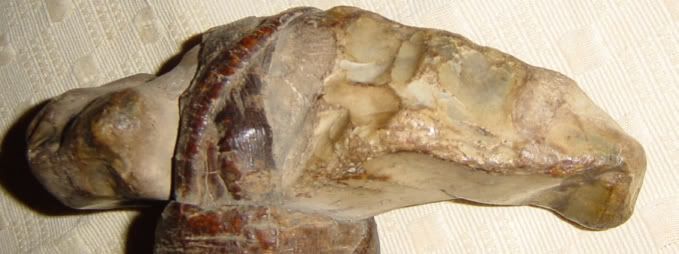 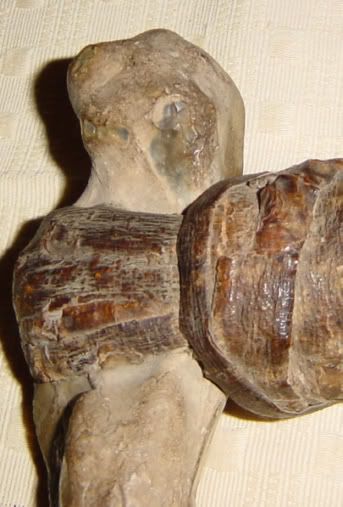 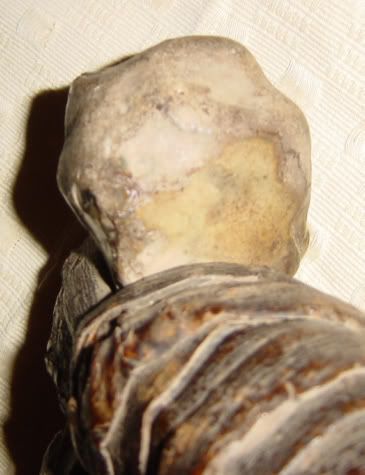
|
|
|

|
|
|
#15 |
|
Member
Join Date: Dec 2004
Posts: 58
|
Tim, As a collector of Aussie Aboriginal Items (and a resident) I have never seen anything like this in any Australian Aboriginal collections or the literature on same. Cant speak for our Northern neighbors though. There are many Stone hafted Aboriginal Axes but none that resemble your item. A most unusual find. Rod
|
|
|

|
|
|
#16 |
|
Member
Join Date: Dec 2004
Location: What is still UK
Posts: 5,949
|
Thanks Rod I think so too. It is amazing to think people travelled such distances in canoes laden with flint stone from Australia. I believe the seas are shallow but that is not much help in a storm, you can drown in a tea cup, not to mention the sharks. I suppose you could island hop but you might not be friends with the nearest island. The whole thing is fasinating.

|
|
|

|
|
|
#17 |
|
Member
Join Date: Dec 2004
Location: What is still UK
Posts: 5,949
|
Considering the importance of club stone, it is possible that good stone by shape or number of kills
 May have been passed from one generation to the next. Like all weapons they hard and tough but also delicate when not used for there intended purpose. May have been passed from one generation to the next. Like all weapons they hard and tough but also delicate when not used for there intended purpose.
|
|
|

|
|
|
#18 |
|
(deceased)
Join Date: Dec 2004
Location: OKLAHOMA, USA
Posts: 3,138
|
A VERY INTERESTING ITEM AND IT DOES SHOW AGE. I WOULD ALSO AGREEE THAT THE STONE WAS SELCETED FOR USE WITH LITTLE MODIFICATION BECAUSE THEY THOUGHT IT HAD SIGNIFICENCE PERHAPS SEEN TO REPRESENT A POWERFUL ANIMAL TOTUM. I DOUBT THAT THE WORD TOTUM WOULD HAVE BEEN USED WHERE THIS WAS MADE BUT IT CONVEYS THE MEANING. THE SHAPES OF NATURAL ROCKS WERE CONSIDERED IMPORTANT TO MANY TRIBAL PEOPLES OVER THE WORLD. THE KUMBAINGERI ABORIGINALS IN N.S.W. MACLEAY RIVER AREA ASSOCIATED SHAPED STONES WITH TRIBAL MYTHS AND STORYS. I HAVE HAD NO LUCK GETTING A EXAMPLE OF A AUSTRALIAN AXE FOR INSPECTION AS I ALWAYS GET OUTBID AND I THINK PRICES HAVE NOW BEEN PUSHED UP ABOVE MY PRICE RANGE.
FROM WHAT I HAVE READ THEY USUALLY HAVE SOME NATURAL GUM RESIN ADHESIVE ON AUSTRALIAN EXAMPLES SO IF THAT IS PRESENT IT WOULD HELP PIN IT DOWN AT LEAST TO AUSTRALIA OR WHERE GUM TREES OR PRESENT WHICH STILL LEAVES A VERY LARGE AREA WITH MANY DIFFERENT TRIBES AND CUSTOMS. I AM ASSUMING THAT THE GUM COMES FROM ONE OF THE TYPES OF EUCULIPTUS TREES PRESENT IN THE AREA BUT NO LONGER REMBER WHERE I READ OR CAME UP WITH THAT BELIEF  THERE IS ALSO THE POSSIBILITY IT MAY HAVE BEEN MADE BY SOMEONE FOR FUN USING OLD METHODS AND MATERIALS. THE BOY SCOUTS HAVE BOOKS WHICH GIVE DIRECTIONS ON HOW TO USLE OLD TRIBAL MATERIALS AND METHODS TO MAKE TOOLS AND WEAPONS WHILE THEY STUDY THE HISTORY AND BELIEFS OF THOSE TIMES AND TRIBES HERE IN THE USA. PERHAPS THAT HAS BEEN DONE AS WELL IN AUSTRALIA AND OF COURSE THE TRIBES HAVE MADE SOUVINEERS FOR QUITE A LONG TIME NOW SO THERE ARE EVEN VERY OLD EXAMPLES OF SOUVINEERS SOME OF WHICH ARE QUITE COLLECTABLE. THERE IS A GOOD BASIC BOOK " AUSTRALIAN ABORIGINAL STONE IMPLEMENTS" BY F. D. McCARTHY IT IS NOT A COFFEE TABLE BOOK WITH PRETTY PICTURES BUT HAS GOOD DRAWING AND LOTS OF GOOD INFORMATION AND I THINK IS NOT AN EXPENSIVE BOOK. REGARDLESS OF THE ORIGIN OF YOUR CLUB I DO LIKE IT A LOT AND AM SURE I WOULD APPRECIATE IT BETTER IF I HAD IT IN HAND. I THINK IT KIND OF LOOKS LIKE A LIZZARD OR THAT SMALL BUG EYED FISH THAT COMES OUT ON LAND THE MUDSKIPPER, PERHAPS ONE EYE HAS BEEN KNOCKED OFF WITH USE. NICE FIND 
|
|
|

|
|
|
#19 |
|
(deceased)
Join Date: Dec 2004
Location: OKLAHOMA, USA
Posts: 3,138
|
I WILL TRY TO SEND A FEW PICTURES IF THEY GO THRU. ALL THREE ARE SAID TO BE AUSTRALIAN.
|
|
|

|
|
|
#20 |
|
Member
Join Date: Dec 2004
Location: What is still UK
Posts: 5,949
|
Scouting for boys, don't make me laugh
  . . I like those Aus aboriginal clubs and axes. There is no gum on my club. I do not think it is possible to really understand it unless it is in your hand. It is a mans weapon and I would imagine a Mr Big type fellow. You must have big scouts in the USA. |
|
|

|
|
|
#21 |
|
Member
Join Date: Dec 2004
Posts: 58
|
Andrew, the "Gum" is from the Spinifix plant, a grass, and is Resin. Cheers Rod
|
|
|

|
|
|
#22 |
|
(deceased)
Join Date: Dec 2004
Location: OKLAHOMA, USA
Posts: 3,138
|
ITS GOOD TO KNOW WHAT THE GUM IS MADE OF I KNEW SPINIFEX WAS A GRASS BUT HAD NO IDEA YOU COULD GET RESIN FROM IT. I HAD HEARD SOME TREES CALLED GUM TREES SO I GUESS I GOT THE WRONG IDEA FROM ASSOCIATION.
 OH WELL I NEVER CLAIM TO BE ALL KNOWING OR PERFECT AND WOULD NEVER SAY ANYTHING AT ALL IF I WAS WORRIED ABOUT BEING WRONG. OH WELL I NEVER CLAIM TO BE ALL KNOWING OR PERFECT AND WOULD NEVER SAY ANYTHING AT ALL IF I WAS WORRIED ABOUT BEING WRONG.  I AM NOT SUGGESTING THE CLUB BEING DISCUSSED IS A BOY SCOUT PROJECT. BUT THE BOWS ,CLUBS, LANCES, SLINGS,SPEARS AND OTHER THINGS WE MADE IN THE SCOUTS WERE MADE OF THE PROPER MATERIALS USING THE OLD TRIBAL TECKNIQUES AND WERE ALL WORKING WEAPONS WITH THE APPROPRIATE DECORATIONS AND MARKINGS. BEING YOUNG BOYS OF COURSE WE USED THEM ROUGHLY UNTIL MOST WERE DAMMAGED OR DESTROYED THERE WERE A FEW INJURYS A BROKEN COLLAR BONE WAS THE MOST SERIOUS IN OUR TROOP. WE EVEN MADE OUR PAINTS USING NATURAL PIGMENTS IF I STILL HAD MINE THEY WOULD BE ABOUT 50 YEARS OLD NOW. I HAVE SEEN SOME OF THOSE ITEMS OVER THE YEARS IN GARAGE SALES AND A FEW I SUSPECT MIGHT HAVE BEEN MADE FOR THAT PURPOSE ON EBAY ALONG WITH THE MANY REPLICA AND SOUVINEER AMERICAN TRIBAL ITEMS. SO I THINK IT IS GOOD INFORMATION FOR COLLECTORS TO HAVE AS IT IS JUST ONE OF THE MANY FACETS OF HOME MADE ITEMS TO BE FOUND, THERE MAY EVEN BE THOSE WHO SPECIALIZE IN COLLECTING SUCH ITEMS. |
|
|

|
|
|
#23 |
|
Member
Join Date: Dec 2004
Posts: 1,247
|
Thanks for the votes of confidence, Tim and Vandoo.
I was googling around to see what I could find in the way of information on Torres Strait Island clubs, and all I found was an article that says that there was a steady trade in club heads between the islands and the southern coast of PNG. The heads here (as I recall) disk shaped with a hole in them, and were made out of good stone. The name of these clubs was something like gabagaba. No pictures, unfortunately, but I'm guessing it's the kind of club mentioned in Stone's Glossary. Anyway, that's not what we have here. I'm sticking with my original guess. 0.02 cents, F |
|
|

|
|
|
#24 |
|
Member
Join Date: Dec 2004
Location: What is still UK
Posts: 5,949
|
Again I feel there is room here for you to lend substance to your thinking with related information and illustration. I can extend the area of investigation throughout Melanesia, Micronesia and find many forms of weapon, wood and stone that in ways relate to the piece in question. The likeness to Biro-Biro totems {how extensive is this and other cassowary cults?} and weapons that were clearly based on this concept plus the fact that flint was a trade commodity in Melanesia and beyond through the Torres Straits is quite weighty. With the absents of field research and time to access collections in various cities I have in the very least tried to present a reasoned and informed opinion. Can you elaborate on your indication that flint nodule clubs were not made? I will keep this in mind and in the coming few months find time to visit the British Museum, and the Brighton museum where there is a good permanent display of Melanesian artifacts to do more research on the matter. I would find it hard to claim anything ardently without having the opportunity to handle the item. It will only be a matter of time before more conclusive evidence emerges like in an earlier discussion.
Last edited by Tim Simmons; 21st March 2007 at 03:07 PM. Reason: spelling |
|
|

|
|
|
#25 |
|
Member
Join Date: Feb 2005
Location: Chicago area
Posts: 327
|
The sinew looks fairly large, as well a long piece. Would a dog be able to provide that? It looks like it would need to be from a larger animal. The cloth covered wire on it looks to be some sort of communications wire & fairly old. I don't think it proves much but may shade some light on when it was once displayed. The worm holes are also a nice touch. Doesn't look like any chips on the ends, so I doubt it was ever used as a tool. Hope you can put a time & place to an interesting piece.
|
|
|

|
|
|
#26 |
|
Member
Join Date: Dec 2004
Location: What is still UK
Posts: 5,949
|
Bill it seems to be one long strip of bark. I assume it is soaked to make it more elastic or it had these properties when fresh to shrink on itself like hide work in East Africa. Forming a very tight hold. It is indeed tight enough to run amok with confidence. Interesting that the this part of the Pacific completed the world telegraph network in 1902 I believe. Here is some more stuff on trade in the Torres Straits and PNG Fly river region.
I have started the process to make an appointment at the British Museums ethnographic department study room on the matter of flint headed clubs and will report all.  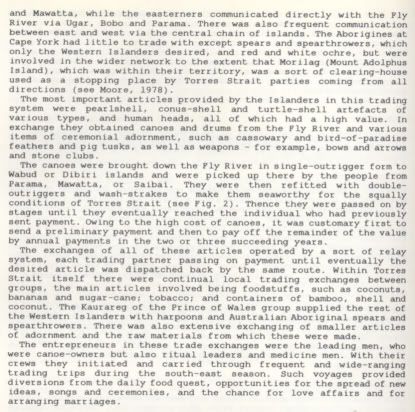
Last edited by Tim Simmons; 21st March 2007 at 06:17 PM. |
|
|

|
|
|
#27 |
|
(deceased)
Join Date: Dec 2004
Location: OKLAHOMA, USA
Posts: 3,138
|
IF IT COULD BE DETERMINED WHAT TYPE OF PLANT BARK OR TYPE OF ANIMAL IF IT IS HIDE OR SINEW IT MIGHT HELP YOU PIN IT DOWN. AS MENTIONED LARGE ANIMALS WERE NOT AVAILABLE IN ALL AREAS WHERE MAN LIVED UNLESS YOU COUNT MAN HIMSELF.
MANY PRIMATIVE SOCIETYS CONSIDERED ROCKS OR OTHER NATURALY OCCURING MATERIALS THAT HAD INTERESTING SHAPES TO HAVE SPECIAL POWERS. MANY TIKI STONES IN HAWAII WERE NATURAL SHAPED STONES FOUND AND BROUGHT INTO THE HEIAU (TEMPLE) THAT REPRESENTED VARIOUS POWERFUL BEINGS OR GODS. I BELEAVE THE PRACTICE WAS WIDESPREAD THRU-OUT POLYNESIA. I WILL BE INTERESTED TO SEE WHAT YOU FIND OUT. GOOD LUCK |
|
|

|
|
|
#28 |
|
Member
Join Date: Dec 2004
Location: What is still UK
Posts: 5,949
|
It is some kind of bark.
|
|
|

|
|
|
#29 |
|
Member
Join Date: Dec 2004
Posts: 58
|
Tim, I understand you have the piece in your hands and we are just looking at pictures, but could the binding be some sort of Reed as opposed to Bark ? Rod
|
|
|

|
|
|
#30 |
|
Member
Join Date: Dec 2004
Location: What is still UK
Posts: 5,949
|
I am almost certain it is a bark binding. Arranging to view and take pictures is no problem as long as they are for my own research and not for publication. Would showing pictures here be considered publication? Perhaps Andrew would know? Anyway a visit to the research center is a necessary preliminary to select the examples to view. I will try and find time to make the first visit as soon as possible hopefully next month sometime. It is also FREE
   
|
|
|

|
 |
|
|